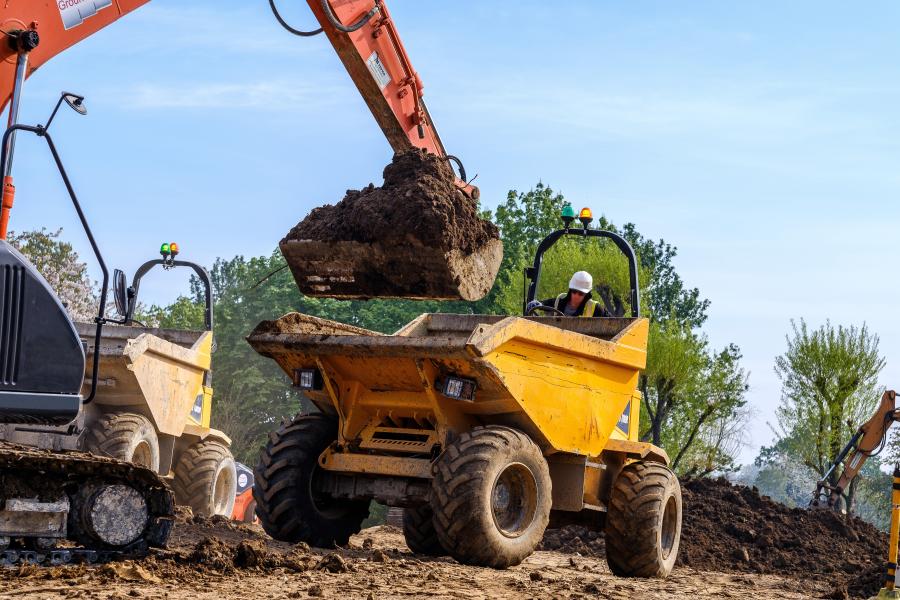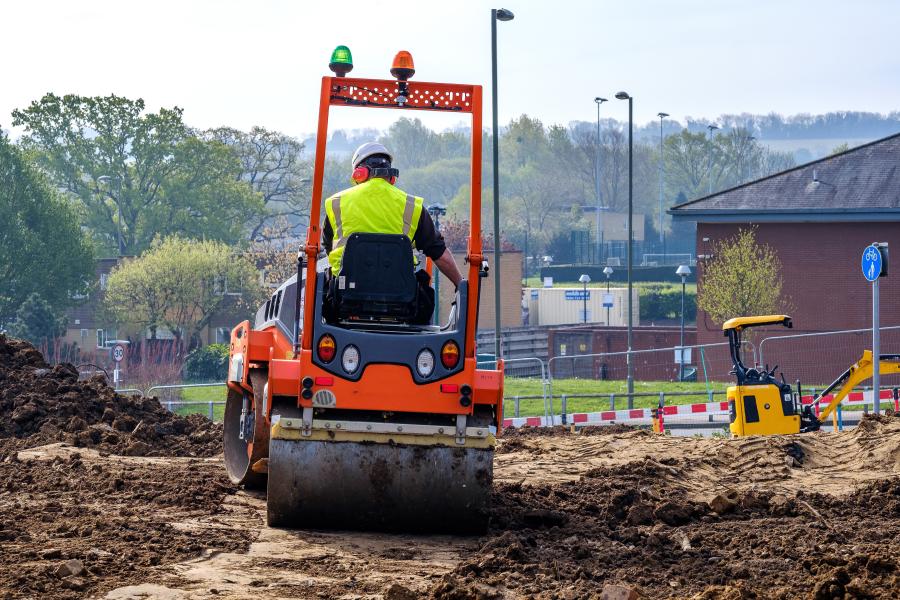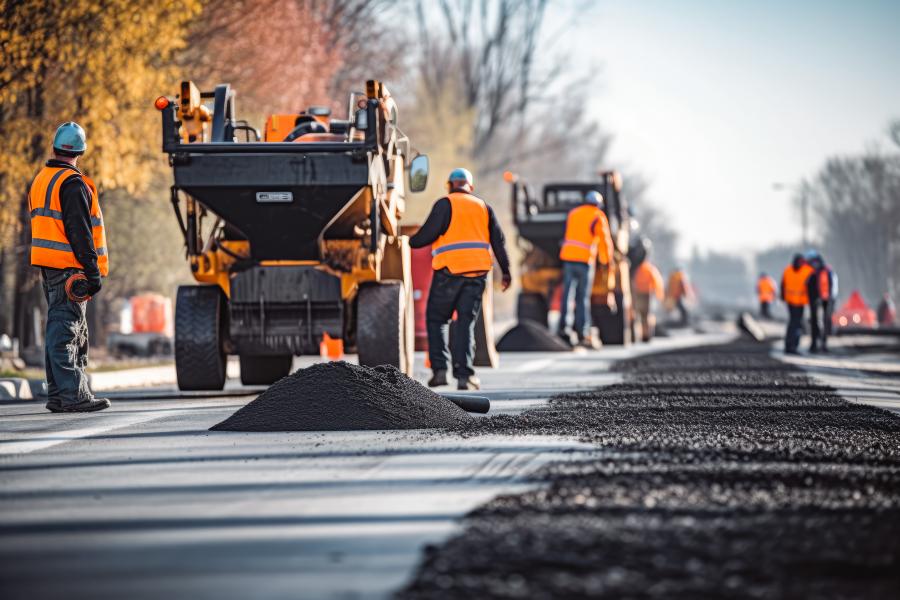Adobe Stock photo
Most materials prices have seen modest inflation while the cost of asphalt rose 20.5 percent in the second quarter of last year.
Construction contractors are between a rock and a hard place: What the Biden administration's IIJA has gifted with a hike in construction work, Buy America policies have taken away by making the work much pricier to perform. Construction costs rose almost 3 percent during the first quarter of 2023, and contractors have seen a 50 percent increase over the past two years. That has the transportation industry nervous for the future.
Last year's National Highway Construction Cost Index (NHCCI) shows it reached "a new all-time high" in the first quarter of 2023. The Bureau of Transportation Statistics (BTS) reported an increase of 2.7 percent from the last quarter of 2022. During the 2.5-year span, second quarter 2022 grew faster than any other period, at 11.9 percent.
BTS also noted that highway construction costs jumped in the last 9 of 10 quarters through the first quarter of 2023.
"Over the 10 quarters, highway construction costs grew 53.8 percent," reported the federal bureau.
Double-Edged Sword
The Biden administration has heavily campaigned the Buy America Act (BABA) with a goal of growing the policy into new areas. A proposed new rulemaking project with a goal of applying BABA to manufactured products is scheduled to be published in April.
"Until the proposal is published, we cannot gauge likely impacts," said Marc Scribner, transportation policy analyst of think tank Reason Foundation. "If the rule is expansive in scope, it is likely to impose significant new construction costs on state departments of transportation."
Scribner said the fed's eagerness to leverage BABA's expansion is "especially unfortunate" for state transportation agencies.
States "have seen highway construction costs increase by 50 percent over the past two years."
Congress imposed BABA procurement requirements for federally funded state highway projects during the Carter administration. The 1978 Surface Transportation Assistance Act made the use of domestic steel, iron and manufactured products mandatory for federally funded projects.
A general waiver was applied back then to products and materials, other than structural steel, used in highway construction.
Scribner said in 1983 Congress find-tuned BABA requirements and maintained the general waiver for manufactured products.
"In doing so, FHWA agreed that it was ‘very difficult to identify the various materials and then trace their origin' in complex manufactured products," he said.

Adobe Stock photo
The BABA waiver for manufactured products has held its place on the federal policy books since then.
But labor unions and manufacturers both have opposed the general waiver all this time, citing protectionist issues.
According to Scribner, the anti-trade lobby scored a significant win with IIJA, which included the BABA.
"BABA expressed a general policy preference against any ‘waiver … not limited to the use of specific products for use in a specific project.'"
The Biden administration has applauded the $92 million increase in highway spending that was a major chunk of IIJA.
"Unfortunately, it is increasingly likely that inflation will wipe out the entirety of that funding increase," believes Scribner. "New Buy America requirements on manufactured products will make this problem even worse."
He notes the federal Office of Information and Regulatory Affairs (OIRA) has the impacts of BABA on FHWA projects listed as "undetermined."
Scribner believes this suggests the final rule will determine where annual costs land on the status scale.
It's a matter of whether costs reach $100 million, considered "major" status, or $200 million, "significant" status.
"FHWA could choose to combine any narrowing or repeal of the general waiver with a more robust and permissive product-specific waiver process."
Scribner maintains that policymakers need to understand that in the "real world of budget constraints," cost increases translate to less work.
"Federally mandated cost increases necessarily translate to fewer transportation projects and reduced benefits for Americans," he said. "The best option would be for Congress to reconsider BABA and instead codify a general manufactured products waiver."
This would reduce uncertainty and avoid cost increases associated with the "significant" interpretation of BABA's manufactured products application, he said.
Industry's Perspective
As an example of the tenuous situation, Washington State finds its transportation construction activity hamstrung by construction inflation.
WSDOT advertised a Seattle bridge project with a cost of just more than $800 million. The agency received only two bids, and the lowest was approximately $1.3 billion.
"Such a massive overshoot of the estimated price tag is cause for concern to lawmakers on its own," wrote David Kroman of the Seattle Times.

Adobe Stock photo
In July, the state awarded a contract for work on I-405 toll lanes that was $230 million over its estimated price. And a contract for related work on Highway 167 was 40 percent over the estimation. The price to convert three ferries to hybrid-electric went up by $30 million, or 25 percent, according to the Times.
The situation has state lawmakers concerned. Washington is on a "15-year sprint" to build out its transportation network.
"It makes it tough to do all of the projects we've voted on to pass and to do," Sen. Curtis King said. "It makes it tough to meet those promises."
Several factors are at play, including material costs, supply-chain delays — and inflation.
"But WSDOT has raised particular alarm about a trend noticed over the last year and a half: declining competition for large design-build contracts," wrote Kroman.
As recently as 2021, the state averaged more than six bids per project. So far in 2023, that number has dropped to around 2.5, he noted.
"It's certainly a concerning trend because we have a lot of design builds coming up in the next couple of years," said Chris Christopher, WSDOT.
The combined demand for contractors and labor shortages has created a one-two punch in the gut for the state's transportation build-out.
"We've got a lot of large contracts happening and the contractors who are capable … are not as numerous as they need to be," said Sen. Marko Liias.
As a result, the state is considering ways to create more appeal for smaller contractors, including breaking these megaprojects into multiple, smaller contracts.
For now, Rep. Jake Fey proposed rejecting Highway 520 bids and revisiting the details of the project. "We don't have another $500 million laying around."
FHWA's Take On Index Results
It's a situation affecting contractors across the transportation construction spectrum and well beyond Washington State.
In analyzing the latest NHCC index results, FHWA reported that for the second quarter of 2023 a 3.8 percent increase continued from the first quarter.
"Compared to the historical quarterly average of 1.4 percent growth, this is still higher than average inflation," said FHWA.
The agency said the numbers are "less than the high inflation observed during 2021 and 2022, where average quarterly growth was 5.2 percent."
They suggested that elevated inflation in 2021 and 2022 may have been driven by supply chain disruptions and fluctuating oil prices.
"Current trends in the index indicate that as these factors stabilize, the NHCCI may revert to its long-term average."
Overall changes in such construction-related indexes suggests an easing of inflation on material prices, said FHWA.
"Divergence in producer price index [PPI] and NHCCI suggests factors other than material input prices may be contributing to NHCCI inflation," it said.
"Notably, the PPI for asphalt showed a 20.5 percent increase during 2023 Q2 after showing a 22.2 percent decrease during 2023 Q1."
Other construction-related PPI such as materials, concrete products and fabricated structural metal showed modest inflation between 0-2 percent.
"The asphalt price volatility combined with relatively stable prices for other material may partially explain why the NHCCI continues to outpace the PPI."
The Real Numbers, Crunched
The Eno Center noted that when FHWA released its latest cost index, it had to admit construction inflation had not slowed.
In fact, the transportation think tank said, the cost of building highways increased by 3.8 percent in the second quarter of 2023. That figure is equivalent to a 15.3 percent annual inflation rate, said the policy organization.
"This shows that, even though inflation had lessened elsewhere in the economy by that point, it was not yet done with highway construction."
FHWA tracks construction costs quarterly through the NHCC index. In mid-2021, according to Eno, the index began growing rapidly. It peaked in the April-June 2022 quarter, and had a "temporary respite" in the fourth quarter of 2022, after which acceleration began once more.
"Since the end of 2020, the NHCCI says that highway construction costs have increased by 59.3 percent," reported the Eno Center.
The organization is not surprised by the fact that the largest share of the increase was from rises in the cost of asphalt, dictated by the price of petroleum.
"But the second-largest cause of the quarterly increase was from traffic control, which is particularly labor-intensive," said Eno policy analysts.
FHWA concluded that while it's suggested labor costs are a driving factor in NHCCI inflation, the "relatively low and stable inflation" proves inconsistent
"The disparities in growth among the indices underline that each index's sensitivity to broader events varies," said the federal agency.
Those factors include COVID-19 pandemic, supply chain disruptions, material shortages, and oil price swings, FHWA added.
"New FHWA spending obligations in fiscal years 2021, 2022 and the first three quarters of 2023 totaled $152 billion," noted Eno.
The organization suggests re-basing highway construction costs the last quarter of 2020, then deflate everything after that.
The result is that $152 million in new obligations deflates to a "real" total of $116 billion, according to the Eno Center.
The think tank figures that $35.2 billion in real buying power of the IIJA and regular funding has been lost to highway construction cost inflation since then. CEG
Lucy Perry
Lucy Perry has 30 years of experience covering the U.S. construction industry. She has served as Editor of paving and lifting magazines, and has created content for many national and international construction trade publications. A native of Baton Rouge, Louisiana, she has a Journalism degree from Louisiana State University, and is an avid fan of all LSU sports. She resides in Kansas City, Missouri, with her husband, who has turned her into a major fan of the NFL Kansas City Chiefs. When she's not chasing after Lucy, their dachshund, Lucy likes to create mixed-media art.
Read more from Lucy Perry here.
Today's top stories

















